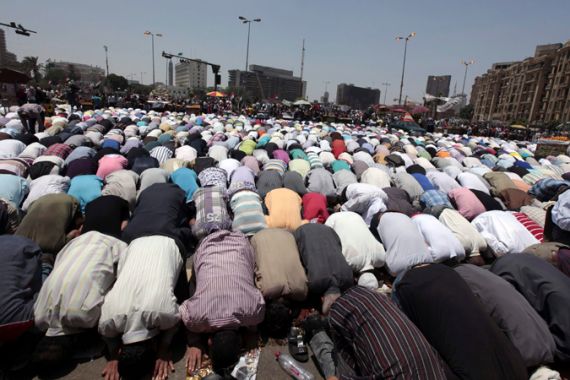Protesters rally against Shafik in Cairo
Several thousand gather in Tahrir Square to oppose Mubarak-era prime minister Ahmed Shafik’s bid for presidency.

A crowd of several thousand people has gathered in Cairo’s Tahrir Square to protest against Ahmed Shafik, Hosni Mubarak’s final prime minister and one of the two candidates in a presidential runoff election later this month.
The protesters want Shafik expelled from the election, scheduled for June 16 and 17. He is running against Mohammed Morsi, the Brotherhood’s candidate, after the two finished second and first, respectively, in the first round of balloting last month.
Egypt’s supreme court is due to rule next week on the so-called “political isolation” law, which bars former high-ranking regime officials from running for public office. The law was approved by parliament earlier this year. If it is upheld by the court, Shafik would be barred from the runoff.
The protesters are also angry about verdicts handed down last week in the trial of Mubarak, his sons, and his aides. A Cairo court sentenced the former president to life in prison for complicity to murder. Habib al-Adly, his former interior minister, was also convicted.
But Mubarak’s two sons were acquitted of corruption charges, and the court acquitted six of Adly’s senior aides, including the former heads of Cairo security and the notorious Central Security Forces, on murder charges.
|
Sherine Tadros reports from Tahrir Square |
Protesters in the square have been chanting slogans against the courts, including “the judiciary must be cleansed.” Some of the chants have also been directed against state media, according to Al Jazeera’s Rawya Rageh.
One group of demonstrators held a mock trial for the former president, which ended with a verdict calling for his execution.
A group of women tried to organise a rally against sexual harassment – dozens of women have been harassed and assaulted in the square this week – but it ended when a mob of men attacked them. Some of the women took shelter in buildings around the square; others managed to flee in taxis.
‘Obedient youth’
Shafik, meanwhile, once again went on the offensive against the Muslim Brotherhood. He repeated accusations from earlier in the week, that the group helped to kill protesters during last year’s revolution. A spokesman for the Brotherhood, Mohammad Ghozlan, has called the accusations “illogical.”
Shafik also accused the Brotherhood of wanting “obedient youth that kiss hands,” and promised to uphold freedoms as president.
“Public squares will be free and secure for expression,” he said. “I promise you, no youth will be arrested for political activities.”
Despite his pledges, many Egyptian activists fear that a Shafik presidency will spark a harsh crackdown on freedom of expression.
The ruling on Shafik’s candidacy will be one of several major political developments next week. The court will also decide whether the parliament itself is constitutional: A lower court found that the electoral process – allowing political parties to compete with independent candidates for some seats – might be unconstitutional.
If the supreme court agrees, the parliament would be dissolved and new elections would be called.
Parliament is also scheduled to convene on Tuesday to appoint members of the 100-member assembly which will draft a new constitution. Political parties recently reached a deal on the makeup of that assembly, ending weeks of negotiations.
